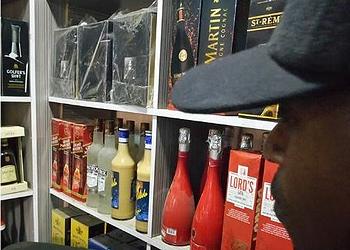
LYON, France, July 1, 2019 (ENS) – More than US$117 million worth of potentially dangerous fake food and drink was seized and 672 individuals arrested worldwide in Interpol’s latest Operation Opson.
Tampered expiry dates on cheese and chicken, controlled medicines added to drink products and meat stored in unsanitary conditions were some of the offenses discovered during the operation.
More than 18.7 million items were recovered in shops, markets and during transport checks during Operation Opson VIII, coordinated by Interpol and Europol. In total, officials seized some 16,000 tonnes of fake food and 33 million liters of fake or adulterated drinks. Expired and unsanitary foods were taken out of circulation
Police, customs, national food regulatory authorities and private sector partners in 78 countries took part in the five-month operation which ran from December 2018 through April 2019. The results were announced late last month.
Checks to identify illicit products were carried out across the participating countries.

Counterfeit alcohol continues to be a top concern globally. Police in Russia shut down an illicit vodka production site, seizing 4,200 liters of counterfeit alcohol and an additional 6,000 empty bottles, while in South Africa three individuals were arrested after alcohol meant for export was repackaged and sold nationally to avoid taxes.
“Counterfeit and substandard food and beverages can be found on the shelves in shops around the world, and their increasing sale online is exacerbating the threat that food crime poses to the public,” said Interpol’s Director of Organized and Emerging Crime Paul Stanfield.
Meat kept in substandard conditions was discovered in Albania.
Authorities in Cambodia recovered potentially dangerous seafood.
Targeted raids based on intelligence led to the dismantling of counterfeit honey production sites in Eritrea.
Authorities in Zimbabwe seized nearly 14,000 liters of soft drinks for sale which contained high levels of the active ingredient in erectile dysfunction medication, a potentially deadly situation for unsuspecting consumers.
Authorities in Belarus confiscated more than 60 tonnes of apples which were being transported with forged documentation, highlighting a rise in the use of fraudulent health, agricultural or transportation certificates.
“Operation Opson VIII saw a substantial amount of counterfeit food and drink taken out of circulation, but there is much more that can be done. Interpol calls for further efforts and better coordination at the national, regional and international levels in order to stem this tide which endangers the health of consumers worldwide,” said Stanfield.
For the first time, this year’s operation looked at organic food products and the growing trend of products that fail to meet national or regional organic standards, falsely claiming to be organic in order to sell at higher prices.

“This operation shows yet again that criminals will take advantage of any and every opportunity open to them to make a profit. The volume of the seizures confirms that food fraud affects all types of products and all regions of the world,” said Jari Liukku, who heads Europol’s European Serious and Organised Crime Centre.
“It is hurting the consumers’ wallets. In the best of cases, food fraud is the deception of consumers, whereby they pay for something they do not get, but in the worst cases, food fraud can result in serious harm to the public’s health,” he said.
It is the duty of Europol and law enforcement more generally to make sure that what consumers get in their plates is genuine and safe,” Liukku said.
In addition to the fake food and drink, other illicit products recovered included cosmetics, medicines and medical devices, footwear, clothing, handbags, wristwatches, sunglasses, soap and toothpaste worth an estimated US$6.1 million.
During Operation Opson checks, Kenyan authorities confiscated more than US$13 million in counterfeit currency and arrested four individuals allegedly involved in the counterfeiting scheme.
Copyright Environment News Service (ENS) 2019. All rights reserved.
